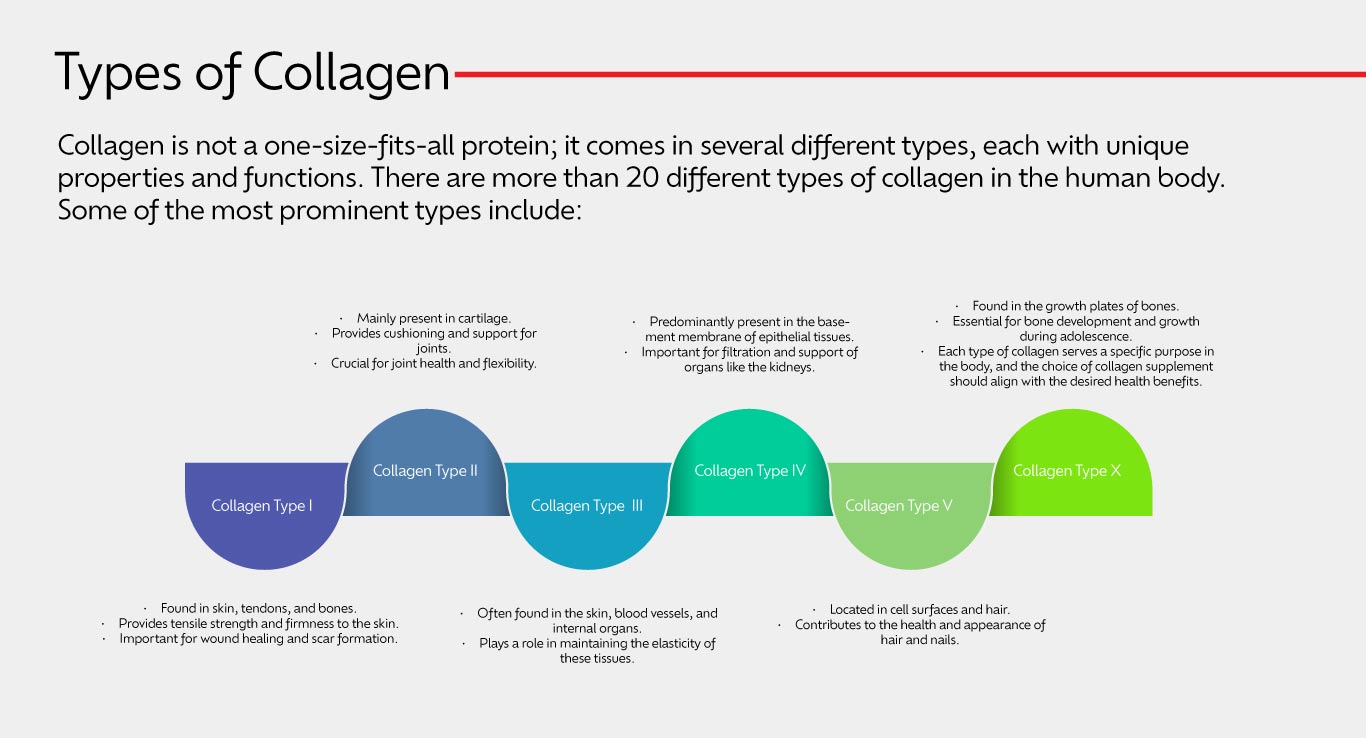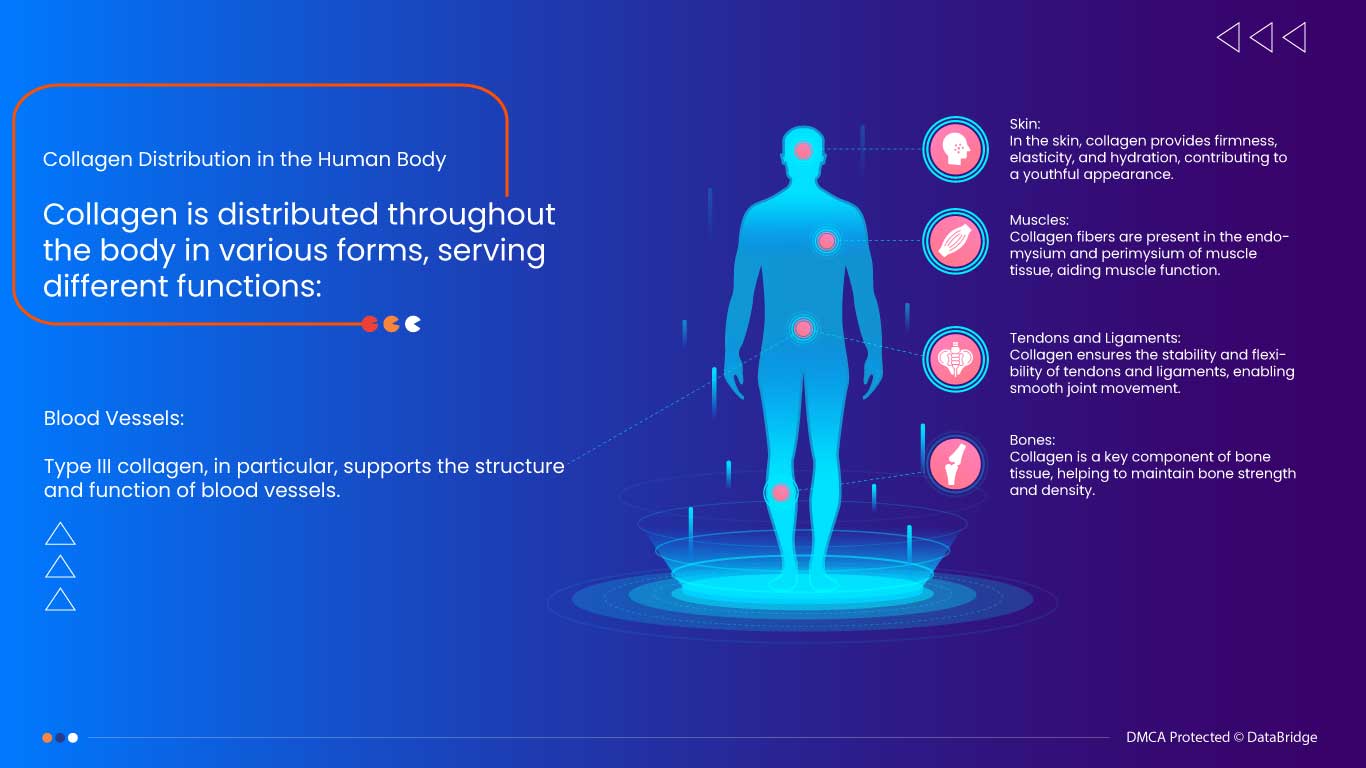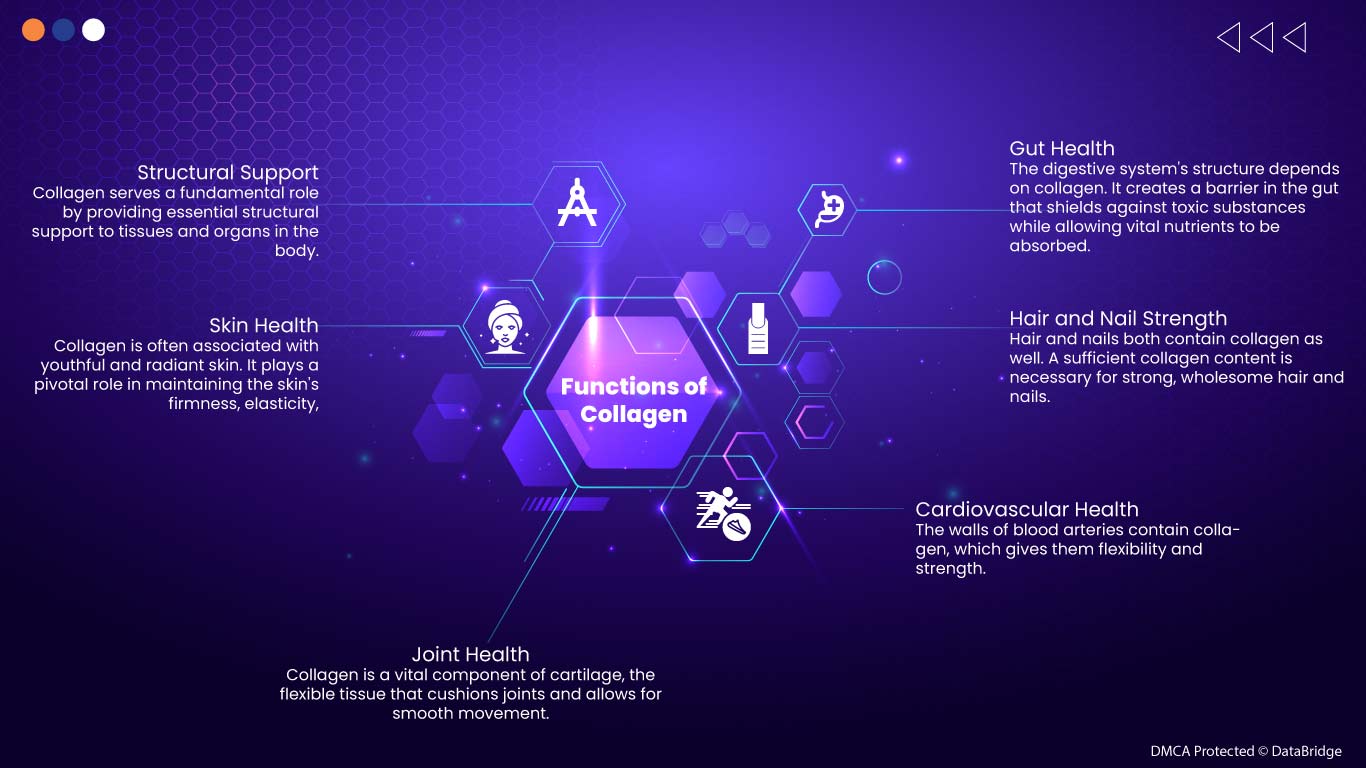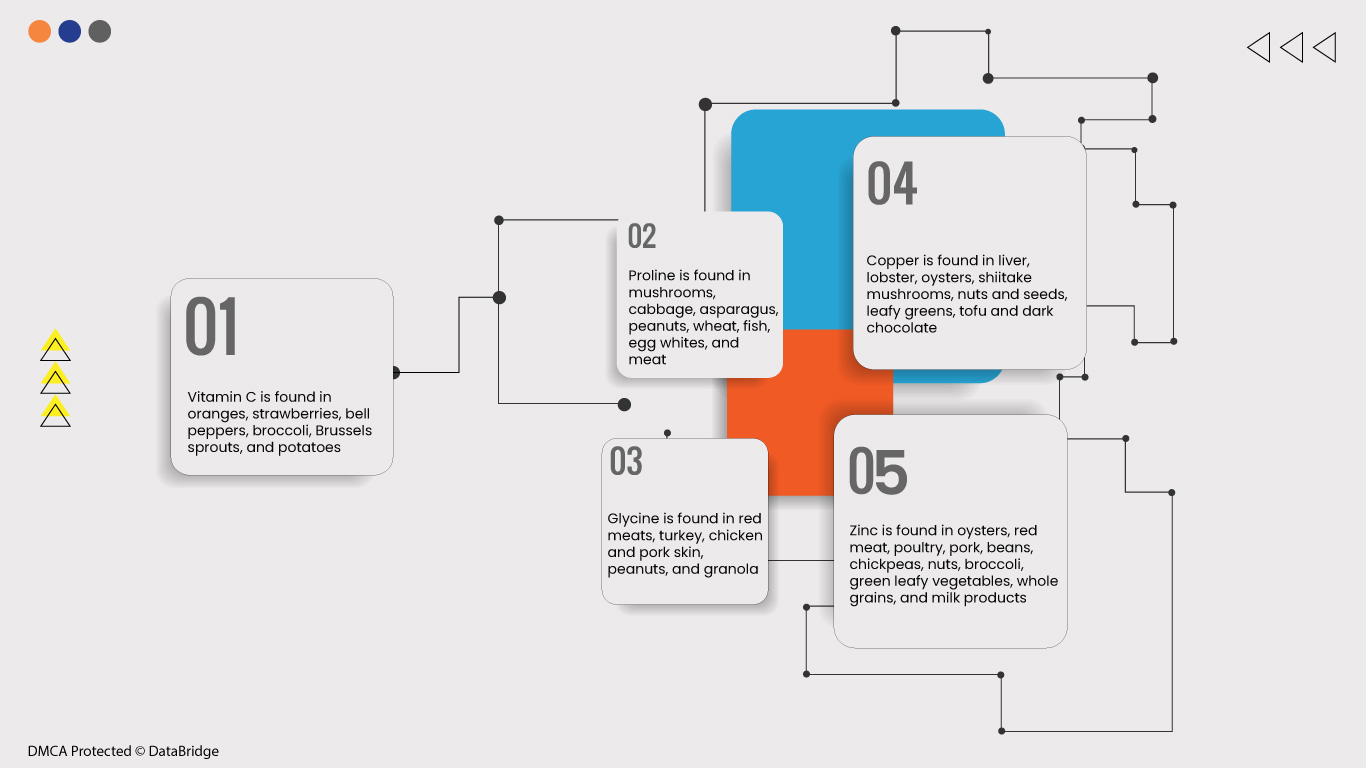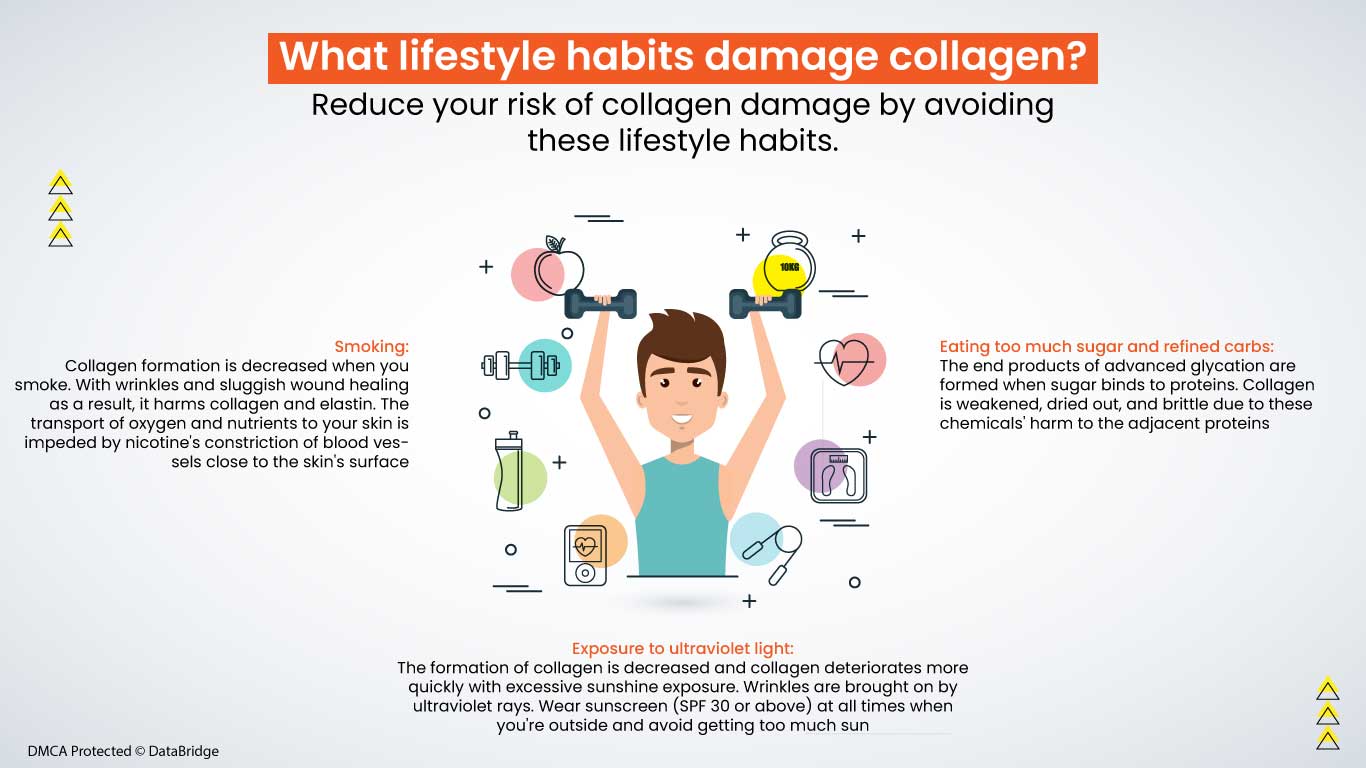The extraordinary protein known as collagen, also known as the body's glue, is essential for preserving human health. Collagen is a critical human body component, often described as nature's scaffolding. It plays a fundamental role in maintaining the structural integrity of various tissues, including skin, bones, tendons, and cartilage. Our collagen production decreases as we age, leading to various health issues and aesthetic concerns. In recent years, collagen supplements have gained popularity as a means to promote youthful skin, joint health, and overall vitality. Although collagen is best known for its use in skincare and cosmetic products, it is a versatile and important substance that serves purposes far beyond aesthetics.
The hydrolyzed collagen market is rapidly expanding, driven by the growing demand for collagen-based supplements and functional foods. Hydrolyzed collagen, derived from animal sources such as fish or bovine, is processed to make it more bioavailable. This type of collagen is gaining popularity for its benefits in promoting skin health, joint mobility, and overall wellness. With increasing consumer awareness of its advantages, the hydrolyzed collagen market is poised for substantial growth.
Data Bridge Market Research analyses that the hydrolysed collagen market is expected to reach USD 1,882.37 million by 2030, which was USD 1,174.80 million in 2022, registering a CAGR of 6.07% during the forecast period of 2023 to 2030.
To know more, visit https://www.databridgemarketresearch.com/reports/global-hydrolyzed-collagen-market
The global fish collagen peptides market is experiencing significant growth due to rising interest in natural and sustainable sources of collagen. Derived from fish skin and scales, these peptides are known for their bioavailability and various health benefits. They find applications in cosmetics, pharmaceuticals, and functional foods, reflecting a growing trend towards marine-based collagen solutions. This market's expansion is expected to continue as consumers seek eco-friendly alternatives to traditional collagen sources.
Data Bridge Market Research analyses that the global fish collagen peptides market which was USD 348.07 million in 2022, would rocket up to USD 678.42 million by 2030, and is expected to undergo a CAGR of 8.7% during the forecast period 2023 to 2030.
To know more, visit https://www.databridgemarketresearch.com/reports/global-fish-collagen-peptides-market
The Vital Role of Collagen: Essential Protein for Health, Beauty, and Overall Well-being
The most prevalent protein in the human body, collagen accounts for 25% to 35% of all the proteins in our bodies. It can be found in many different tissues and organs, including the intestines, tendons, ligaments, muscles, and blood vessels. Collagen serves as a scaffold to keep our body together and is responsible for various tissues' strength and structural integrity.
Beyond collagen role in structure, collagen is now understood to have vital roles in enhancing general health. It supports the resilience of our bones, the elasticity of our skin, and the mobility of our joints. Additionally, it greatly impacts our cardiovascular, digestive, and even hair and nail health.
Data Bridge Market Research analyses that the collagen market was valued at USD 5,769.57 million in 2021 and is expected to reach the value of USD 9,195.82 million by 2029, at a CAGR of 6.00% during the forecast period of 2022-2029.
To know more, visit https://www.databridgemarketresearch.com/reports/global-collagen-market
Collagen: Nature's Essential Protein Scaffold for Health and Vitality
Decoding Collagen: Unraveling the Intricacies of Its Molecular Structure
Collagen boasts a distinctive molecular structure defined by its remarkable triple helical arrangement. This structural uniqueness is at the core of collagen's exceptional properties. Within the collagen molecule, there are three tightly wound polypeptide chains, referred to as alpha chains. These alpha chains twist around each other, forming a robust, triple-stranded helix. Collagen is a prime contender for its crucial function as a structural protein in the human body because of this particular configuration, which gives it its exceptional strength and stability.
This triple helical structure is what provides collagen with its tensile strength, allowing it to endure the demands of supporting skin, tendons, bones, and various other tissues. Understanding the intricacies of collagen's molecular architecture is pivotal in appreciating its fundamental role in preserving the integrity and structure of our body's essential components.
Types of Collagen
Collagen is not a one-size-fits-all protein; it comes in several different types, each with unique properties and functions. There are more than 20 different types of collagen in the human body. Some of the most prominent types include:
Collagen Type I
Found in skin, tendons, and bones.
Provides tensile strength and firmness to the skin.
Important for wound healing and scar formation.
Collagen Type II
Mainly present in cartilage.
Provides cushioning and support for joints.
Crucial for joint health and flexibility.
Collagen Type III
Often found in the skin, blood vessels, and internal organs.
Plays a role in maintaining the elasticity of these tissues.
Collagen Type IV
Predominantly present in the basement membrane of epithelial tissues.
Important for filtration and support of organs like the kidneys.
Collagen Type V
Located in cell surfaces and hair.
Contributes to the health and appearance of hair and nails.
Collagen Type X
Found in the growth plates of bones.
Essential for bone development and growth during adolescence.
Each type of collagen serves a specific purpose in the body, and the choice of collagen supplement should align with the desired health benefits.
Collagen Production Decline with Age: Impact on Skin, Joints, and Bones
As we age, the production of collagen, a vital protein for our body's structural integrity, undergoes a gradual but significant decline. This process usually commences in our mid-20s and continues throughout our lives. The consequences of reduced collagen production are far-reaching and affect various aspects of our well-being. Skin loses its firmness and elasticity, giving rise to wrinkles and sagging. Joints may suffer from decreased cushioning, leading to pain and stiffness, while bones become more susceptible to fractures due to a decline in density. Understanding this natural aging process and the pivotal role of collagen is essential. It highlights the importance of collagen supplementation in preserving health, vitality, and the youthful attributes we cherish.
Collagen Distribution in the Human Body
Collagen is distributed throughout the body in various forms, serving different functions:
- Skin: In the skin, collagen provides firmness, elasticity, and hydration, contributing to a youthful appearance
- Bones: Collagen is a key component of bone tissue, helping to maintain bone strength and density
- Tendons and Ligaments: Collagen ensures the stability and flexibility of tendons and ligaments, enabling smooth joint movement
- Muscles: Collagen fibers are present in the endomysium and perimysium of muscle tissue, aiding muscle function
- Blood Vessels: Type III collagen, in particular, supports the structure and function of blood vessels
Functions of Collagen: Structural Support
Collagen serves a fundamental role by providing essential structural support to tissues and organs in the body. It acts as a sturdy framework that binds cells, imparting strength and resilience to tissues. Without collagen, the body would lack the necessary structural integrity for vital functions such as movement, stability, and protection. Essentially, collagen acts as nature's scaffolding, ensuring that our body's components are held together, promoting overall structural stability, and enabling the seamless operation of various physiological processes.
Skin Health
Collagen is often associated with youthful and radiant skin. It plays a pivotal role in maintaining the skin's firmness, elasticity, and hydration. As we age, collagen production decreases, leading to the formation of wrinkles, fine lines, and sagging skin. By replenishing collagen levels, individuals can support skin health and potentially reduce the visible signs of aging.
Joint Health
Collagen is a vital component of cartilage, the flexible tissue that cushions joints and allows for smooth movement. Cartilage contains Type II collagen, which is essential for joint health. As we age or engage in strenuous physical activity, the cartilage can degrade, leading to joint discomfort and stiffness. Collagen supplements have shown promise in promoting joint health and reducing joint-related issues.
Gut Health
The digestive system's structure depends on collagen. It creates a barrier in the gut that shields against toxic substances while allowing vital nutrients to be absorbed. According to some studies, taking collagen supplements may support disorders such as leaky gut syndrome and aid to preserve gut health. Recent studies have suggested that incorporating collagen supplements into one's routine can play a pivotal role in supporting conditions like leaky gut syndrome. By reinforcing the gut's integrity, these supplements not only combat digestive issues but also contribute significantly to preserving optimal gut health, fostering a balanced and thriving internal environment.
Hair and Nail Strength
Hair and nails both contain collagen as well. A sufficient collagen content is necessary for strong, wholesome hair and nails. Collagen supplementation may encourage hair and nail development and lessen brittleness.
Cardiovascular Health
The walls of blood arteries contain collagen, which gives them flexibility and strength. By promoting appropriate blood vessel function and lowering the risk of diseases such as atherosclerosis, maintaining healthy collagen levels may contribute to cardiovascular health.
Muscle Mass and Strength
While not a primary component of muscle tissue, collagen plays a supportive role in muscle function. Collagen-rich connective tissues surround and protect muscle fibers. Ensuring these tissues remain healthy is essential for maintaining muscle mass and strength, especially in athletes and active individuals.
Collagen Supplements: A Boom in Demand for Anti-Aging Solutions
In the past decade, there has been an unprecedented surge in the popularity of collagen supplements, driven by a growing need to address visible signs of aging and enhance overall health. Recent data reveals a remarkable increase in consumer interest, with sales soaring due to the demand for natural and non-invasive solutions. Collagen supplements are now widely recognized for their ability to combat fine lines, wrinkles, and sagging skin, providing a youthful glow. Moreover, these supplements have gained traction in promoting joint health and general well-being. The market data showcases an exponential growth, underscoring the shift towards collagen-based products as an essential part of modern beauty and health regimes. As people increasingly prioritize holistic health, collagen supplements have emerged as a cornerstone in the pursuit of natural, age-defying solutions.
Collagen Peptides: Enhancing Health and Beauty from Within
Collagen peptides, often referred to as small fragments of animal collagen, have recently gained popularity, primarily as a potent supplement for enhancing skin health and overall well-being. This natural protein, abundantly present in our bodies, plays a pivotal role in preserving the skin's elasticity and youthful appearance. However, it's crucial to note that absorbing collagen in its intact form is incredible. Collagen needs to be broken down into more manageable parts, like peptides or amino acids, in order to become accessible. Oral collagen supplements are readily available in the form of tablets and powders, both of which are formulated for ease of consumption. These supplements typically contain two or three essential amino acids. They are marketed as either hydrolyzed collagen or collagen peptides, indicating that the collagen has undergone a process where it is broken down into smaller, digestible fragments.
Once ingested, your digestive system plays a pivotal role in assisting the absorption of collagen peptides, ensuring that these vital building blocks reach the targeted areas of the body, contributing to healthier, more radiant skin, and supporting overall well-being. Understanding the science behind collagen peptides underscores their value as a convenient and effective means to harness the benefits of this essential protein.
Data Bridge Market Research analyses that the global collagen peptides market growing at a CAGR of 10.50% in the forecast period of 2022-2029. The increased demand among consumers to live a healthier lifestyle has assisted the expansion of the collagen peptides market.
To know more about the study visit, https://www.databridgemarketresearch.com/reports/global-collagen-peptides-market
Does Consuming Collagen-Rich Foods Raise our Body's Collagen Levels?
Our body is unable to absorb collagen in its whole form. Our body breaks down the collagen proteins we consume into amino acids. Therefore, consuming meals high in collagen won't raise our body's collagen levels immediately.
Nevertheless, a variety of foods that offer the essential raw materials for collagen formation can be consumed as part of a balanced diet. Proline and glycine, two amino acids, are present in these meals. Additionally required for the process are vitamin C, zinc, and copper. These vitamins, minerals, and amino acids can be found in foods such as:
- Vitamin C is found in oranges, strawberries, bell peppers, broccoli, Brussels sprouts, and potatoes
- Proline is found in mushrooms, cabbage, asparagus, peanuts, wheat, fish, egg whites, and meat
- Glycine is found in red meats, turkey, chicken and pork skin, peanuts, and granola
- Copper is found in liver, lobster, oysters, shiitake mushrooms, nuts and seeds, leafy greens, tofu and dark chocolate
- Zinc is found in oysters, red meat, poultry, pork, beans, chickpeas, nuts, broccoli, green leafy vegetables, whole grains, and milk products
Marine Collagen: A Natural Beauty and Wellness Wonder
Marine collagen has gained significant attention in recent years for its potential health and beauty benefits. This collagen supplement, which comes from fish and other marine sources, has grown in popularity as a remedy for improving skin, hair, nails, and general health. Marine collagen is usually chosen collagen because of its higher environmental sustainability. Marine collagen may help maintain healthy skin, hair, bones, and muscular mass while slowing aging.
In addition, marine collagen is thought to support youthful-looking skin and hair as you age, among other health advantages, though the proof for these claims is still sparse.
Data Bridge Market Research analyses that the marine collagen market is expected to witness market growth at a rate of 7.54% in the forecast period of 2022 to 2029.
To know more about the study visit, https://www.databridgemarketresearch.com/reports/global-marine-collagen-market
What Lifestyle Habits Damage Collagen?
Reduce the risk of collagen damage by avoiding these lifestyle habits:
- Smoking: Collagen formation is decreased when you smoke. With wrinkles and sluggish wound healing as a result, it harms collagen and elastin. The transport of oxygen and nutrients to your skin is impeded by nicotine's constriction of blood vessels close to the skin's surface
- Eating too much sugar and refined carbs: The end products of advanced glycation are formed when sugar binds to proteins. Collagen is weakened, dried out, and brittle due to these chemicals' harm to the adjacent proteins
- Exposure to ultraviolet light: The formation of collagen is decreased and collagen deteriorates more quickly with excessive sunshine exposure. Wrinkles are brought on by ultraviolet rays. Wear sunscreen (SPF 30 or above) at all times when you're outside and avoid getting too much sun
Conclusion: Harnessing the Power of Collagen for Optimal Health
Collagen is without a doubt one of nature's most crucial components for maintaining human wellness.It is a crucial protein for vitality and wellness due to its several functions in preserving skin, joints, bones, and general structural integrity. Collagen can be found in a variety of natural food sources, but supplements offer a convenient means of achieving certain health goals.
Selecting collagen supplements requires careful consideration, akin to any other dietary addition. Factors such as type, source, formulation, quality, and appropriate dosage merit meticulous evaluation. It is strongly advisable to engage in a dialogue with a healthcare professional prior to embarking on a novel supplement regimen, particularly if you possess underlying health concerns or uncertainties.
The horizon of possibilities for harnessing the potential of collagen to elevate human health and well-being appears exceedingly promising. Ongoing research continues to unveil the multifaceted benefits and versatile applications of collagen. It stands as a potentially transformative asset for fortifying your holistic health, whether your aspirations encompass revitalized skin, resilient joints, or an optimized gut ecosystem.
